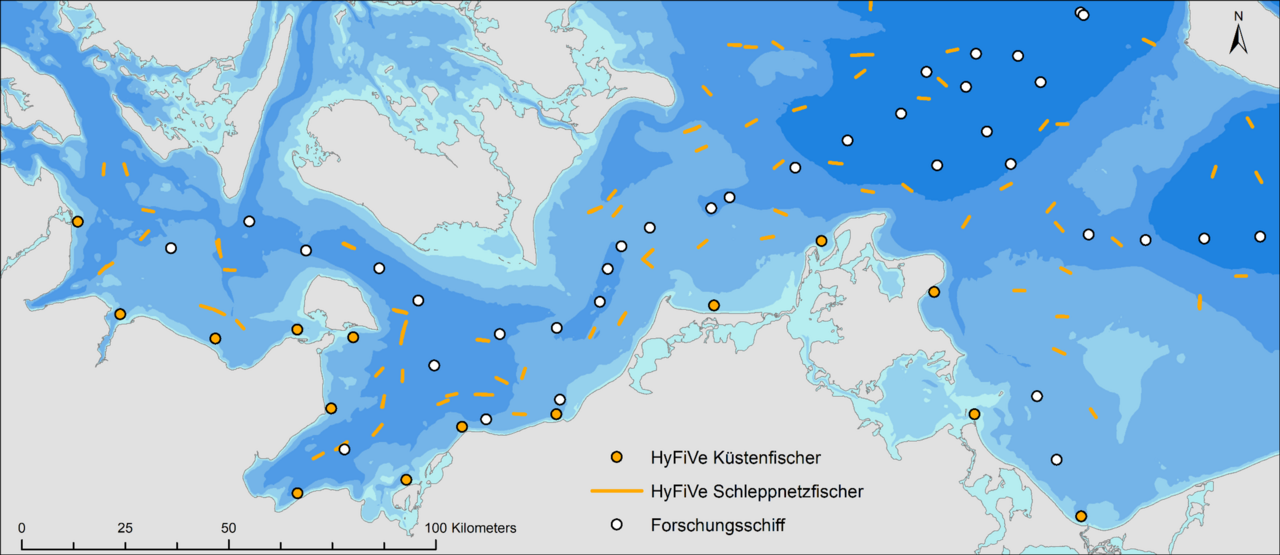Project
Prime Prevention: Involving fisheries in predicting marine biological hazards with adapted monitoring systems

Involving fisheries in predicting marine biological hazards with appropriate monitoring systems
Due to the expansion of sustainable use of the oceans within the framework of the Blue Growth Strategy, and the expected increase in marine natural hazards such as harmful microorganisms or hypoxia in consequence to climate change, the socio-economic relevance of marine biological hazards and their prevention will increase in the future, also for German coastal waters. Currently, there is no jointly coordinated strategy among coastal states in Germany to address this societal challenge. Moreover, there is a lack of efficient, flexible, widely accessible, user-friendly observation technology. This makes it difficult to monitor the occurrence of marine biological hazards at appropriate spatial and temporal scales tailored to society's needs for early warning systems to prevent and minimize socioeconomic impacts. PrimePrevention aims to provide knowledge and technical solutions for monitoring and predicting the occurrence of marine biological hazards in order to derive recommendations for actions to protect society from their economic and health impacts, also considering cascading effects from additional marine extremes. The establishment of a smart and flexible ocean observation strategy that is suited to serve the observation needs of individual stakeholder groups is at the heart of PrimePrevention. In the first phase, observation and prediction methods will be developed exemplarily for selected biological hazards (cyanobacteria, Vibrio and hypoxia) in the western Baltic Sea, that will be applied in the field in cooperation with end users, and extended to other biological hazards and geographical areas in the second funding period.
Background and Objective
The Thünen Institute's substantive work in the project will take place in two work packages in particular. The first focal point will be the further development of smart marine observation systems ("standard measurement boxes"). In WP2.1, standardised, modular in-situ measuring devices will be developed and tested under various conditions in close cooperation with the project partners. In addition to the actual measuring boxes, the focus is on developing an adapted framework programme to ensure efficient data flow and integration into monitoring systems. The second focus of the Thünen Institute's work within the project will be the integration of commercial fisheries into the automated data collection of hydrographic data (physical, chemical and optical) and eDNA sampling in the western Baltic Sea. To this end, concepts will be developed on how the spatial and temporal resolution of the model data can be increased by using fisheries as a "ships-of-opportunity" in order to better record and predict the occurrence of hypoxia and cyanobacteria blooms in the future. This work will be carried out in close coordination with the work in WP 1 and WP4, where a centralised exchange with end users will take place and the evaluation of the changed ecosystem services will also be carried out.
The technological developments should enable the establishment of two fundamental pillars of the PrimePrevention measurement network. The "discrete measurements" pillar aims to involve fishermen and the fishing fleet as a platform for collecting measurement data for the early detection and prevention of extreme biological events. The "continuous measurements" pillar aims to establish a smart-sampling capable measurement network with ship-based and stationary measurements. The aim is to continuously collect and analyse basic measurement parameters with high temporal and spatial coverage; here too, the integration of fisheries is a central aspect of our work.
Thünen-Contact

Involved Thünen-Partners
Involved external Thünen-Partners
- Alfred Wegener Institut (AWI) - Helmholtz -Zentrum für Polar und Meeresforschung
(Bremerhaven, List (Sylt), Deutschland) - Leibniz-Institut für Ostseeforschung Warnemünde (IOW)
(Warnemünde, Deutschland) -
Jade Hochschule Oldenburg
(Oldenburg, Deutschland)
Funding Body
-
Federal Ministry of Education and Research (BMBF)
(national, öffentlich)
Duration
1.2024 - 12.2026
More Information
Project funding number: 03F0953H
Project status:
ongoing

![[Translate to English:] [Translate to English:]](/media/_processed_/d/7/csm_Startseite-OF_03_c0dfd6e750.png)
![[Translate to English:] [Translate to English:]](/media/_processed_/a/3/csm_20181116-151457-Stella-Jerome-Fischfalle-Warnem%C3%BCnde-Dorsche-im-Netzk%C3%A4fig-5691_heller_3050c72fa2.png)




